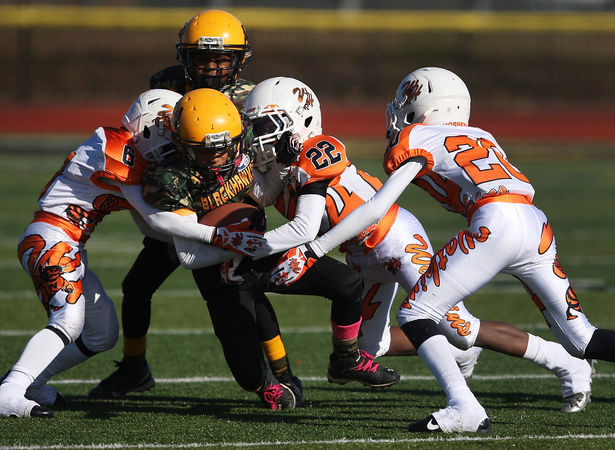Developing Aggression in Youth Football Players
Coach, do you accept the notion that not all kids have the ‘makeup’ to play football? I confidently believe it is a false assumption. Often times we say lack of aggression translates to a kid being ‘soft’, but is the kid to blame? Players that lack aggression can certainly develop it (and they must!) it just takes some good old fashioned hard work. Keep in mind, passive play on the football field leads to injuries!
3 signs you have an aggressive football player:
- He is prepared, consistently attends practice, consistently works hard.
- He understands his assignment on the field and where he needs to be. Finishes blocks and tackles.
- He excels at individual and team challenges in competition.
You always strive to be the most aggressive football team on the field and it starts at practice. Competitive and tough practices breeds physical teams. This will get the beast out of your kids. No one wants to be embarrassed in front of their teammates, get the 1 on 1 match-ups going!
Developing aggression in youth football:
- Each act should be with aggression as soon as child hits the practice field. If he puts his helmet on, have him do it aggressively. When he drinks a cup of water, have him do it with aggression. No meek actions.
- Football is a sport that requires learning- lots of it. When a child understands and is properly taught the fundamentals of the sport then he can he reach the distinguished title of ‘football player’. Any kid can earn the label.
- Develop confidence with proper hitting/tackling at practice. As a youth football coach it is your duty to keep safety as the first priority. Don’t forget to make practice time fun and upbeat.
- Moderate kid-to-kid hitting at practice. Use alternate types of tackling drills as well, such as having kids aggressively tackle a blocking shield/dummy. Youth football athletes aren’t at practice to get beat up and there is no reason to hit two hours per day.
- Strength building with pull-ups, pushups and planks.
- Promote grunting. Ask your youth football athlete to step up his grunt and centralize his aggression. There will be breath control- a common benefit to a loud shriek, and studies have shown that grunting helps deploy a more focused energy.
Aggression has stark importance in child’s development on and off the field. Disciplined aggression learned on the field, translates to positive gains off the field (it’s the attitude of if you want something bad enough, have to go out and get it).
Coach, we want to hear your thoughts. Are you limiting hits at practice or hitting more? How do you build aggression with your athletes, list them at the comments below or join the discussion on Facebook.
